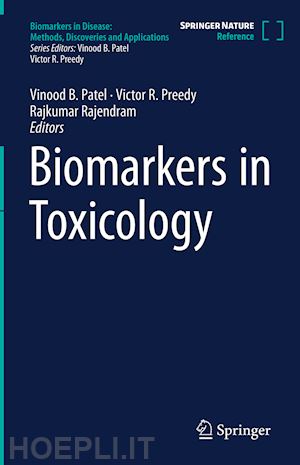

Questo prodotto usufruisce delle SPEDIZIONI GRATIS
selezionando l'opzione Corriere Veloce in fase di ordine.
Pagabile anche con Carta della cultura giovani e del merito, 18App Bonus Cultura e Carta del Docente
This handbook of the series Biomarkers in Disease informs comprehensively about all aspects of monitoring and detecting toxicity in the human body and model organisms. Biomarkers for assessing toxicity in diverse organs are presented and different assays and methods are explained. Single compounds and drugs and their toxicity for humans are shown and the methods for detection described.
Similar to all the volumes of the Biomarkers in Disease series, the chapters are written by experts in their field, each chapter features key facts summarizing the most important aspects of its respective topic and the definitions of words and terms facilitate the reading and understanding.
This handbook is a must-have for researchers in toxicology and biomedicine who analyze the effects of drugs and various other substances in the human body and in model organisms. It also serves as a thorough guide for clinicians and pharmacologists.
Markers of liver toxicity and biomarkers.- Biomarkers of kidney toxicity. -Biomarkers of cardiac toxicity: microRNA and beyond.-Biomarkers of gastrointestinal toxicity.- Biomarkers of skin toxicity.- Skeletal muscle biomarkers in toxicity studies.- Bone markers of toxicity.- biochemical markers of brain damage.- DNA adducts as biomarkers of nutritional toxicity.- Biomarkers of pollution toxicity: measuring heavy metals in blood.- Challenge-comet assay: applications to toxicity.- Alkylation adducts of nucleic acids as a biomarkers .-TGx-DDI transcriptomic biomarker: Features and applications.-DNA biomarkers: an updated narrative.- CRISPR/Cas9 Whole-Genome Screens: applications to environmental pollutants.-Apoptotic biomarkers in toxicity studies.- 5'UTR methylation as a biomarkers: investigating volatile organics.- 5-Fluorouracil degradation rate and a biomarker of capecitabine toxicity.- Investigating the blood-brain barrier as a marker of toxicology.- Biomarkers of oxidative stress: investigating apigenin.- Histology as a biomarker in toxicity: applications to investigating Syzygium guineense.- Hair metabolomics and biomarker discovery .-Markers of hepatotoxicity using metabolomics: applications to MDMA, ecstasy.- 1H-NMR metabolomics and biomarkers of myotoxins.- Nanoparticle-induced toxicity and transcriptomics as a biomarker discovery platform.- Urine metabolomics and biomarker discovery.-microRNA profiling as a biomarker platform: carcinogens and beyond.
Vinood B. Patel, BSc, PhD, FRSC, is a Reader in Clinical Biochemistry at the University of Westminster. Dr Patel graduated from the University of Portsmouth with a degree in Pharmacology and completed his PhD in protein metabolism from King’s College London in 1997. His postdoctoral work was carried out at Wake Forest University Baptist Medical School studying structural-functional alterations to mitochondrial ribosomes, where he developed novel techniques to characterize their biophysical properties. In 2014, he was elected as a Fellow to The Royal Society of Chemistry. Dr Patel is a nationally and internationally recognized researcher and was involved in several NIH-funded biomedical grants related to disease. Dr Patel has extensively published biomedical books in the area of diet, biomarkers, toxicology, nutrition and health prevention.
Victor R. Preedy PhD, DSc, FRSC, FRSB, FRSPH, FRCPath is Professor of Clinical Biochemistry andPathology in King’s College Hospital and Emeritus Professor of Nutritional Biochemistry in King’s College London. Professor Preedy graduated in 1974 with a Combined Honours Degree in Biology and Physiology with Pharmacology. He gained his Ph.D. in 1981, in the field of nutrition and metabolism, from the London School of Hygiene and Tropical Medicine, University of London. His second doctorate was awarded for his work on protein metabolism, with a focus on toxicity. Professor Preedy is a Fellow to four Royal Colleges and has published over 700 articles, including abstracts, peer-reviewed works, reviews and books.
Rajkumar Rajendram, AKC, BSc (Hons), MBBS (Dist), EDIC, FRCP Lond is a Consultant at King Abdulaziz Medical City, and Joint Appointment Assistant Professor of Medicine at King Saud bin Abdulaziz University for Health Sciences, Riyadh, Saudi Arabia. In 2001, Dr Rajendram graduated with honours from King’s College, London. He thentrained in general medicine and intensive care in Oxford, attaining membership of the Royal College of Physicians (MRCP) in 2004, and becoming a Consultant at the John Radcliffe Hospital, Oxford, in 2011. Dr Rajendram also trained in anaesthesia and became a fellow of the Royal College of Anaesthetists (FRCA) in 2009, and a fellow of the Faculty of Intensive Care Medicine (FFICM) in 2014. During his medical training was also a visiting lecturer at King’s College London; devoting significant time and effort into research on toxicology and nutrition. He has published over 300 textbook chapters, review articles, peer-reviewed papers, and abstracts.











Il sito utilizza cookie ed altri strumenti di tracciamento che raccolgono informazioni dal dispositivo dell’utente. Oltre ai cookie tecnici ed analitici aggregati, strettamente necessari per il funzionamento di questo sito web, previo consenso dell’utente possono essere installati cookie di profilazione e marketing e cookie dei social media. Cliccando su “Accetto tutti i cookie” saranno attivate tutte le categorie di cookie. Per accettare solo deterninate categorie di cookie, cliccare invece su “Impostazioni cookie”. Chiudendo il banner o continuando a navigare saranno installati solo cookie tecnici. Per maggiori dettagli, consultare la Cookie Policy.